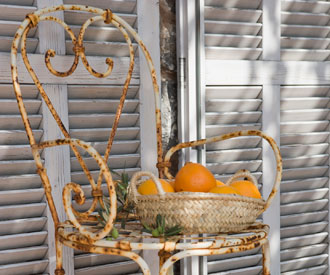Here are more thoughts and practices for finding spiritual meaning in things.
Appreciate Wabi Sabi
Leonard Koren is an expert on the Japanese aesthetic of Wabi Sabi which he defines as “a beauty of things imperfect, impermanent, and incomplete. It is the beauty of things modest and humble.” We have a chipped tea pot which we have had for years and still it has a special place in our hearts for its flawed beauty. Identify a few favorite objects in your home that have Wabi Sabi.

Hold a Party for Your Things
Gather all the electric gadgets and give them a good cleaning. Check to see that the chords are in good shape and if any filters need changing. As part of your party fun, give out “Exceptional Service Awards” to signify your gratitude for what these things do for you.
Apologize to the Offended Object
In Thirsty, Swimming in the Lake, David K. Reynolds ponders the courtesy that should characterize our interactions with inanimate objects. He writes: “If you slam a door you must return to it, open it, and close it properly, and apologize to it for your insensitivity. . . . If you kick up the corner of a rug or otherwise behave thoughtlessly, particularly if you are in haste or angry or otherwise upset at the time, you must correct the behavior and apologize to the offended object.” Make the expansion of your courtesy to things a special emphasis of your spiritual practice for this week. Notice how many times you have to apologize.
Be Generous to Those Who Maintain Your Things
Maids, gardeners, pool-maintenance workers, and other service providers are often the ones who take care of the upkeep of our possessions. Since money is the medium that conveys our thanks, be generous with tips for these folk. If you do not employ such workers, then reward the hotel workers who make beds, vacuum rooms, and clean the bathrooms while you are away from home.

What Not to Do With Things
In 365 Zen edited by Jean Smith, Zen teacher Robert Aiken talks about the absolute value of all things and the respect which must be given to them: “To truly practice Zen therefore means not leaving lights burning where they are not needed, not allowing water to run unnecessarily from the faucet, and not loading up your plate and leaving food uneaten.” Make a list of bad habits that are harmful to things that need to be changed in your household. Work on at least one a week.
Pass on Your Things to Others
In his book How Now, Raphael Cushnir reveals that another way of honoring things we no longer use is to let them go so that others can appreciate them. Here is a practice you may want to do once a year:
“Give yourself a day to open every drawer, cupboard, and closet in your home. Inventory all your stuff with an eye toward letting it go. If you absolutely need something, leave it where it is. If you haven’t used something in a year and have no emotional attachment to it, put it in a “recycle” pile. If you haven’t used it in a year but do have an emotional attachment to it, put it in a “maybe” pile.
“Spend a little time with each item in the maybe pile. Let the feelings connected to it flow. Notice whether the attachment is one that seems to shut you down or open you up. If it’s the former, consider adding that item to the recycle pile.
“Then, when you’re all done, recycle everything you’re ready to let go of, and revel in your new-found spaciousness.”












